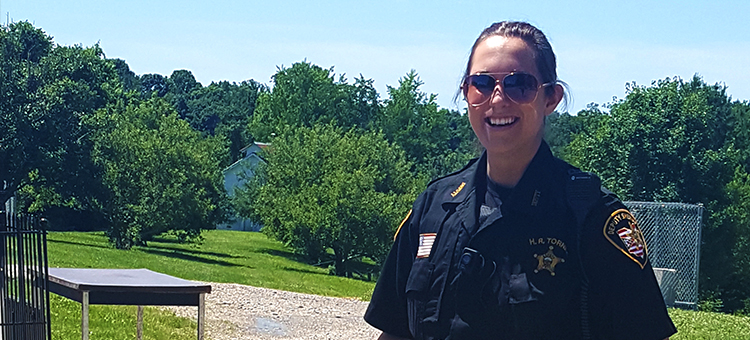MARIETTA, OHIO (June 15, 2018)–We live in an age where women represent nearly half of the workforce, but when it comes to law enforcement, they represent only a small percentage in agencies nationwide. However, Washington State College of Ohio (WSCO) and the Washington County Sheriff’s Office are partnering to make a change in the statistics.
Nationwide, women make-up less than 13% of the law enforcement workforce, according to the Department of Labor. Here in the Mid-Ohio Valley, however, Washington County Sheriff Larry Mincks is far ahead of the national average with more than a third of his workforce represented by women. Moving that needle has taken more than just the desire to hire more females; it has taken an effort to educate women about the value they bring to this career.
“The point of our efforts is to bring balance,” explained Commander John Burdette, WSCO’s Peace Office Basic Academy (POBA) Program Director. “I work very closely with Sheriff Mincks and he’s expressed to me the need for more diversity in his police department, so that means we need more diversity in our classrooms. We need police departments that are representative of our community.”
Nationally, the discrepancy in the number of females in law enforcement isn’t based on hiring practices, rather it lies in the applicant pool. Women simply aren’t applying for these positions and Sheriff Mincks attributes the lack of interest to perception. “Women may look at law enforcement as a male-dominated career, one that might intimidate them in applying for the position,” he explained.
Burdette believes bringing awareness to the prospects of this career is the first line of defense to this perception. “First, we need to make women aware of the opportunities in law enforcement. But more importantly,” he continued, “they need to understand that they can make a vitally important impact on our community.”
Tonya Tullius is one of 12 corrections officer at the Washington County Sheriff’s Office and has been through the Corrections Academy offered at WSCO. She agrees with Burdette that knowledge is vital to expanding this career path for women. “I think it’s a matter of education,” she affirmed. She also points to a lack of notoriety attached to the job title. “This is a career that is not in the spotlight and does not draw the attention of people entering the job market.”
Sheriff Mincks explained the value of a well-balanced agency, inclusive of all demographics, is beneficial to more than just the police department, “it makes not only the department stronger, but the community as a whole will benefit,” he affirmed. “An example would be, having a bi-lingual law enforcement officer to assist with non-English speaking victims, witnesses or suspects.”
A career in law enforcement isn’t just about being a police officer. This is a career that offers dozens of career choices, including a bailiff, game warden, parole officer, detective, and more. In fact, Washington County Sheriff’s Deputy Hannah Tornes identified varied opportunities as one of the best parts of working in law enforcement. Deputy Tornes, who graduated from WSCO with a dual major in correction and law enforcement in 2015 and then completed the POBA program in 2016, is the county dog warden. She has all the same authority as a road patrol deputy, but her focus is on companion animal calls.
From a young age, Tornes had a budding desire to work in the profession, but originally thought it would be as a sketch artist. “I realized drawing was a hobby and I did not want to make a career of it,” she acknowledged. “The interest of law enforcement never left, though.” While in college Tornes asked to complete two internships, one in corrections and another in law enforcement. That opportunity helped direct her career path. “I realized I wanted to pursue my career in law enforcement.”
Tornes admits there are challenges to being a woman in this profession, however, she’s quick to point out that these challenges aren’t specific to where she works, “they could happen at any job.” She also concedes that law enforcement isn’t easy work for neither men nor women. “It’s not about being a male or female, it’s about doing your job and having each other’s back. It’s hard work but absolutely worth it.”
While there’s an apparent shortage of women represented in the field of law enforcement, diversity in race and culture are also sorely under-represented nationwide explained Burdette. “For anyone interested in law enforcement, regardless of gender or race, it’s a career that has an abundance of opportunity,” he assured. In Ohio, to get started requires the successful completion of the Ohio Peace Officer Training Commission’s (OPOTC) certified Peace Officer Basic Academy (POBA) program. WSCO’s POBA program has produced hundreds of peace officers and for several years has boasted a 100% pass rate on the Ohio Peace Officer Training Commission (OPOTC) state certification test. Graduates from the academy hold prominent law enforcement position across the state.
The academy’s 730 hours of mandated training is available in two formats at Washington State—evening or day academy. The next POBA academy is scheduled to begin on August 20, however, applicants are required to pass a pre-academy physical fitness test. Dates for PT exams are scheduled throughout July.
For more information about WSCO’s POBA program, contact Commander John Burdette at 740.374.8716 ext. 1540 or jburdette1@wscc.edu.
For more than 45 years, Washington State College of Ohio has provided residents of the Mid-Ohio Valley the opportunity to realize dreams, to enhance skills, and to broaden understanding. Whether you are a recent high school graduate or an adult student looking to move your life in a new direction, Washington State has the classes to suit your needs. For more information about Washington State College of Ohio, visit www.wscc.edu or call 740.374.8716.





